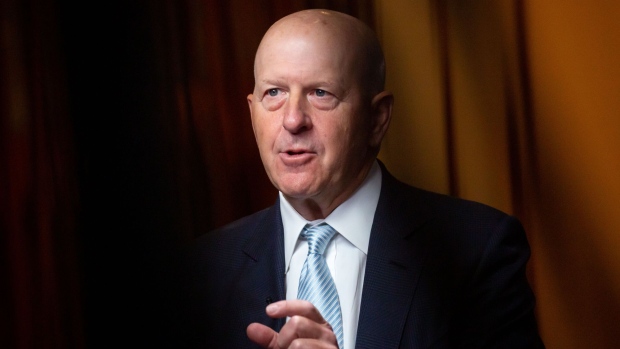Jan 17, 2023
Goldman Sachs’s Trading Beat Cushions Consumer, Dealmaking Slump
, Bloomberg News

(Bloomberg) -- Goldman Sachs Group Inc. posted a bigger increase in expenses than analysts expected as it set aside more for compensation in the fourth quarter.
Fourth-quarter compensation costs of $3.8 billion were 16% higher than in the same period last year, though that gauge dropped on a full-year basis. That indicates the bank’s leadership was too conservative with its set-aside for pay in the first nine months of 2022. Managers will still have to deliver a tough bonus message to its bankers and traders this week.
The investment-banking giant has also poured billions of dollars into its retail effort, which includes the Apple Card and specialty-lending platform GreenSky. That operation, which posted revenue of $513 million for the quarter, has posted $3.8 billion in pretax losses over the past three years.
“Revenue fell short, expenses (comp ratio and otherwise) and credit costs were both higher — this is not a great combination,” Susan Roth Katzke, an analyst at Credit Suisse Group AG, said in a note. “The question is how much the expense overrun and reserve build pave the way forward amidst Goldman’s ‘realignment’.”
Goldman shares dropped 2.1% to $366.30 at 9:33 a.m. in New York, and are down 4.1% in the past 12 months.
Operating expenses were $8.09 billion for the fourth quarter, 11% higher than a year earlier and 5% higher than the previous quarter. Revenue for the period was $10.6 billion, a 16% drop from a year earlier.
“Widely expected to be awful, Goldman Sachs’s Q4 results were even more miserable than anticipated,” Octavio Marenzi, the chief executive officer of Opimas, said in a note. “The real problem lies in the fact that operating expenses shot up 11%, while revenues tumbled. This strongly suggests more cost cutting and layoffs are going to come.”
The bank’s return-on-equity for the year dropped to 10.2%, falling below the 14% to 16% target it set for itself earlier in 2022.
Goldman’s asset- and wealth-management business had revenue of $13.4 billion for the year, down 39% from a year earlier. The decrease was driven by a major slide in revenue from equity investments. In 2021, that part of the business had about $9 billion in gains compared with $610 million in 2022.
Revenue from the trading operation totaled $4.76 billion compared with predictions for $4.5 billion, driven by the fixed-income desk. The gains helped counter the industry’s dealmaking slump.
“Against a challenging economic backdrop, we delivered double-digit returns for our shareholders in 2022,” Chief Executive Officer David Solomon said in a statement Tuesday. “Our clear, near-term focus is realizing the benefits of our strategic realignment, which will strengthen our core businesses, scale our growth platforms and improve efficiency.”
Job Cuts
The industrywide slowdown and threat of a recession later this year pushed the bank’s leaders to ax as many as 3,200 jobs last week. Goldman said its investment-banking fees backlog “decreased significantly” from a year earlier.
The report follows fourth-quarter results from the biggest U.S. banks on Friday, which gave investors plenty of reasons to be jittery about the outlook for the coming year. A robust resumption of activity in capital markets is still on hold while increasing provisioning for bad loans looms on the horizon for top lenders.
The firm for the first time is showcasing the results of its key banking and trading units as a single division, an attempt to highlight its strengths relative to peers. As part of changes announced in October, Solomon also undid one of his own signature moves and reunited the wealth-management arm with the asset-management division.
Goldman also scaled back its ambitions for the consumer business, abandoning a goal to do business with the mass market. Key elements of that push have been dismantled, and what’s left has been set aside as the smallest stand-alone division, called Platform Solutions. That unit has been bolstered with the addition of the transaction-banking business.
(Adds analyst’s comment in fourth paragraph, updates shares in fifth.)
©2023 Bloomberg L.P.


